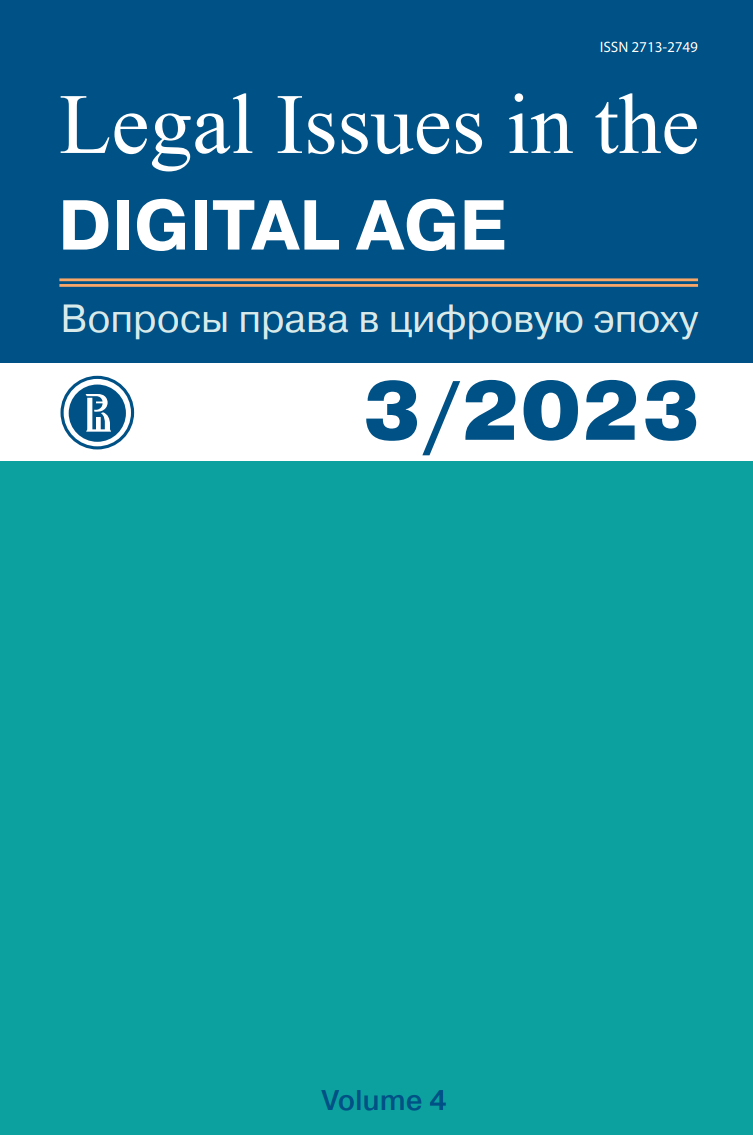“Artificial Intelligence”: Problems of Civil Law Qualification
Abstract
Based on the civil law research methodology, the paper provides an insight into theconcept of “artificial intelligence”, its legal nature and peculiarities of transactions.The subject of research is the underlying doctrine, legal provisions on “artificialintelligence” and their enforcement practices. The research purports to lay atheoretical groundwork for the concept of “artificial intelligence” as a complex thingat law whose structure may comprise a variety of intellectual assets. The applicablecivil law regime — specifics of formalization of the underlying relationships — isdetermined by the legal nature of “artificial intelligence” as an ideal phenomenon.In view of the complex nature of the object in question, the structural system andcomparative law methods were used in the paper. In fact, the use of the structuralsystem method allowed not only to analyze “artificial intelligence” as a complexstructure but also to identify computer software as its core structural element. Thecomparative law method enabled to develop an idea of regulatory mechanism for“artificial intelligence” as well as to demonstrate the specifics of interpretation of theapplicable provisions of intellectual property law. The paper also makes use of specialmethods of inquiry such as the logical and formal methods, with the latter allowingto define the concept of “artificial intelligence” and discuss its core legal features.As a methodological peculiarity, the study combines the theoretical and empiricallevels of cognition. The use of the methods mentioned allowed to explore raisedlegal issues of “artificial intelligence” as they relate to the foundations of civil law.It is concluded that the main frequently used contractual arrangements to disposeof the exclusive right to “artificial intelligence” include the exclusive right transferagreement and the licensing agreement. The paper provides an analysis why anexception from the general rules applicable to exclusive right transfer agreementsand licensing agreements were made for “artificial intelligence”.
References
Dozortsev V.А. (2005) Intellectual Property Rights. Concept. System. Codification Objectives: selected papers. Мoscow: Statut, 416 p. (in Russ.)
Dremliuga R.I., Mamychev A.Yu., Dremliuga O.A., Matyuk Yu. S. (2019) Artificial intelligence as a subject of law: pros and cons. Contemporary Dilemmas: Education, Politics and Values, no. 1, p. 127.
Kaliatin V.О., Pavlova Е.А. et al. (2014) Comments to Resolution No. 5 of the Russian Supreme Court Plenum, Russian Commercial Court Plenum No. 29 “On issues arising in connection with entry into force of Part 4 of the Civil Code”. In: Research Comments of Legal Practice in the Area of Intellectual Property Rights Protection. Мoscow: Norma, 480 p. (in Russ.)
Kuteinikov D.L. et al. (2019) Regulating human interaction with autonomous devices: a discussion of legal regimes. Zakony Rossii=Lex Russica, no. 9, pp. 85–95 (in Russ.) DOI: https://doi.org/10.17803/1729-5920.2019.154.9.085-095
Laptev V.А., Usenkov P.I. et al. (2020) Subject Matter of Business Agreements Today. In: Digital Economy. Conceptual Basis of Legal Regulation of Business in Russia: a research. Мoscow: Prospekt, 488 p. (in Russ.)
Makovsky А.L. (2008) Comments to Article 1240. In: Comments to Part 4 of the Civil Code of Russia (by chapters). Мoscow: Statut, 715 p. (in Russ.)
Мefodieva К.М. (2019) Civil Law Regulation of Digital Data in Germany, U.S and Russia. Candidate of Juridical Sciences Summary. Мoscow, 28 p. (in Russ.)
Pavlova Е.А. (2016) Comments to Article 1240 of the Civil Code. In: Comments to the Civil Code of Russia (Part 4). L.A. Trakhtengerts (ed.). Мoscow: NORMA, 485 p. (in Russ.)
Rozhkova М.А. (2014) Intellectual Property: Main Aspects of Protection. A manual. Мoscow: Prospekt, 248 p. (in Russ.)
Rozhkova М.А. et al. (2018) Qualification of Intellectual Property Items. In: Civil Concept of Intellectual Property in the Russian Legal System: a collection of papers. Мoscow: Statut, 272 p. (in Russ.)
Shilokhvost О.Yu. (2011) Comments to Article 1240. In: Article-by Article Comments to the Civil Code (Part 4). P.V. Krasheninnikov (ed.). Мoscow: Statut, 926 p. (in Russ.)
Somenkov S.А. (2019) Artificial Intelligence: A Thing or a Person? Vestnik Moskovskogo Gosudarstvennogo Juridicheskogo Universiteta imeni Kutafina=Moscow State Kutafin Law University Bulletin, no. 2, pp. 75–85 (in Russ.)
Sukhanov Е.А. (2019) The Sources of Civil Law. In: The Civil Law: a manual. Мoscow: Statut, 576 p. (in Russ.)
Sukhanov Е.А. (2017) Law of Things: manual. Мoscow: Statut, 560 p. (in Russ.)
Tolstoy V.S. (2009) Information Civil Law. Мoscow: Academia, 293 p. (in Russ.)
Vitriansky V.V. (2018) Reform of Civil Law in Russia: Interim Results. Мoscow: Statut, 528 p. (in Russ.)
Authors who publish with this journal agree to the Licensing, Copyright, Open Access and Repository Policy.










